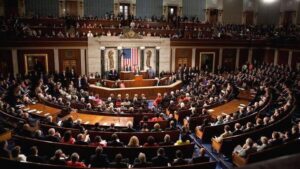U.S. Senate passes GENIUS Act, paving the way for stablecoin regulation
The U.S. Senate has passed the “Guiding and Establishing National Innovation for U.S. Stablecoins” (GENIUS Act), which is the first significant cryptocurrency initiative to be approved by one chamber of Congress.
The legislation, which garnered widespread bipartisan support (68 votes in favor, 30 against), now advances to the House of Representatives for further deliberation.

Proposed by Senator Bill Hagerty (R-TN), the GENIUS Act aims to establish a comprehensive federal framework for the issuance and circulation of stablecoins—digital assets tied to fiat currencies, such as the U.S. dollar. The bill stipulates that issuers must provide a 1:1 backing for tokens using cash or short-term U.S. Treasury bonds, submit to annual audits, and adhere to stringent anti-money laundering and transparency requirements.
Industry reaction and impact
The Senate’s backing represents a watershed moment for digital asset regulation in the U.S. Advocates argue that well-defined regulatory limits will enhance investor confidence, increase the global adoption of dollar-backed digital assets, and reinforce U.S. leadership in the fintech sector. Senator Hagerty characterized the bill as a “pro-growth framework” and highlighted its importance for maintaining “dollar dominance in the digital economy.”
Debate, amendments, and the path ahead
Nevertheless, the bill’s passage was not free of controversy. Several progressive legislators, among them Senator Elizabeth Warren, were against measures that might enable major tech firms to create their own stablecoins and gather user data. Concerns were also raised by critics regarding possible conflicts of interest stemming from the involvement of former President Donald Trump’s family in stablecoin ventures. Due to these problems, changes were made that dealt with ethics and transparency before the definitive vote.
Scott Bessent, the Treasury Secretary, backed the legislation, referring to predictions that the stablecoin market might expand to $3.7 trillion by 2030. He mentioned that the growing demand for stablecoins could contribute to a reduction in government borrowing costs by boosting the demand for U.S. Treasuries.
Industry leaders embraced the Senate’s initiative. Amanda Tuminelli, who serves as the Executive Director of the DeFi Education Fund, described it as a “monumental step” toward achieving balanced crypto regulation. Ji Kim from the Crypto Council for Innovation pointed out that the bill offers much-needed clarity.
The House of Representatives will determine the GENIUS Act’s fate, but competing proposals such as the broader CLARITY Act could impede progress. Nonetheless, momentum is gathering, and the legislation could still become the foundation of stablecoin regulation in the U.S.
Disclaimer and Risk Warning
coinweck does not endorse or is responsible for any content, accuracy, quality, advertising, products, or other materials on this page. The image used in this article is for informational purposes only and is provided to us by a third party. coinweck should not be held responsible for image copyright issues. Contact us if you have any issues or concerns. Readers should do their research before taking any actions related to the company.









